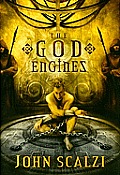Those who have read previous Scalzi novels are warned by the first line that this is something different. The God Engines opens with Captain Ean Tephe, the protagonist and a starship captain, preparing to whip the ship's god. Blood and dismemberment appears on the first page. But with that comes sly humor, resting below the level of the narrative and the awareness of the characters. Scalzi takes an absurd premise — what if starships were literally powered by gods — and extrapolates for all he's worth, creating a surprisingly vivid universe that keeps daring you to forget how crazy it is.
The God Engines is a novella, one of the current trend of high-quality novellas from major authors published in hardcover format by small presses. It can be a bit hard to justify spending that much money for a story that's even shorter than a classic SF novel, but Subterranean does an excellent job if you enjoy books as physical artifacts. The printing is high quality, with a beautiful dust jacket, interior black and white illustrations, and large, readable text. Given the slow fade of the SF magazine industry, this sort of edition is becoming the best way to read new novellas by prominent authors.
Scalzi here took the novella format as an opportunity to do something different. His Old Man's War series owed a lot to Heinlein and the tradition of SF military fiction. The God Engines also follows a military officer and retains the sense of responsibility and duty that underpinned the Old Man's War series, but the challenges here are religious rather than military and the tone and style are far different. Tephe is a worshipper of the true god, who has subjugated most other gods to his will and uses them to power starships that carry his followers farther out in the galaxy, occasionally to do battle with other gods who have not yet been subjugated. Each starship carries a god at its core, who can send the ship through space in ways that no one understands and is kept in chains and beaten to ensure its obedience. Each ship also carries a potential conflict between the priests, who have responsibility for the god and for the spiritual life of the crew, and the military, who deal with the more mundane aspects of ship operation.
The world-building is both surprisingly good and surprisingly deep for such a short book. The God Engines successfully gives the impression of a deep universe with complex rules. Fans of the angels and demons role-playing game In Nomine should particularly seek this one out; Scalzi builds a sort of magic system based around talismans given out by gods and used by their followers to tap their power, and the system of worship and affiliation with gods reminded me quite a bit of some of the complexities that In Nomine offered. But he also has an opportunity, in the conflict between ship's officers and priests, to look at political conflict reminiscent of communist-era political officers on ships (familiar to any Cold War military novel).
The plot starts as a relatively straightforward conflict between Tephe and the ship priest against a backdrop of growing unrest among the gods, but then builds tension as Tephe and his crew are assigned to a vital mission to gain power for their god. The book is full of hints that all is not as it appears, but I was still expecting a relatively straightforward story of discovery of lies and false foundations. The twist that Scalzi throws into the end of the book is quite a bit more than that. He turns the story on its head, with a sense of opening and a glimpse of unexpected information that forms the sense of wonder kick of the best science fiction.
The God Engines is just as dark as the first line implies, so be sure you're in the mood for that, but I think it's one of the better things Scalzi has written. There's a deep universe and I'd read more stories in it, but the story told here is perfect for novella length: long enough to give the reader a satisfying taste, but short enough that it can stay focused on one narrative arc and pull off an ending that wouldn't work in a novel. Recommended, particularly if you like stories that play with the implications of gods and worship.
Reviewed: 2010-07-29
